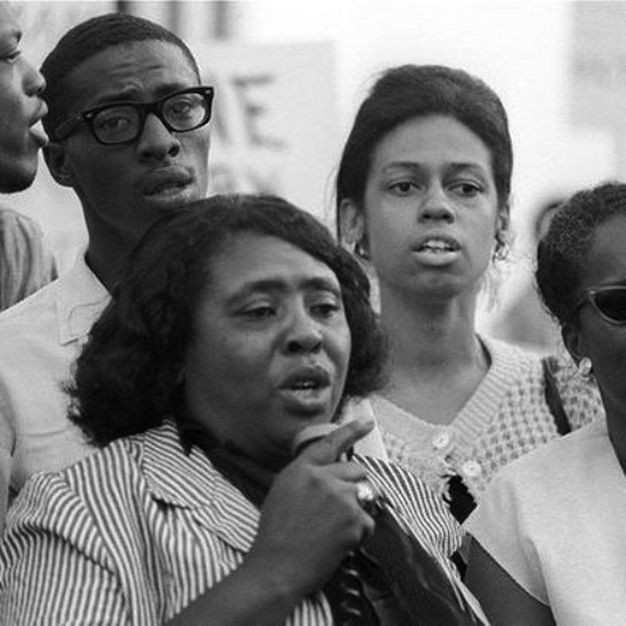
Millennials Are Killing Capitalism
Millennials Are Killing Capitalism
- 2 hours 2 minutes“Refusing Proper Subjection” - Andrew Krinks on the Religious Function of Mass Criminalization
In this episode we speak with Andrew Krinks about his recent book White Property, Black Trespass: Racial Capitalism and the Religious Function of Mass Criminalization.
The book is really interesting and I highly recommend it, this is part 1 of a 2 part discussion we recorded on it. You can pick it up from Massive Bookshop the bookstore that uses their revenue from book sales to bail people out of jail.
In this discussion Krinks goes into the religious function that the mass criminalization of Black, Brown, and dispossessed peoples serves within the racial capitalist system. Engaging with Marxist and materialist explanations as well as Christian theologians and bourgeois philosophers, we get into how police and prisons are tethered deeply with religious ideology, which also finds quarter within the so-called secular theorists who provided the political philosophical underpinnings of the capitalist system. We also get into dynamics of race making and racialist thinking by way of folks like Cedric Robinson and Ruth Wilson Gilmore to examine the connection between race making and property relations.
I’ll also note that last year we hosted a video conversation with Melayna Kay Lamb and Tia Trafford about the philosophical underpinnings of police power that has some important areas of overlap with this discussion as well, but focuses a bit more on European secular philosophy and policing.
Starting on Monday the 6th we’ll be hosting a new live series on our YouTube channel with Mtume Gant who is a filmmaker, media critic, and professor of film, where we will be talking about Cedric Robinson’s Forgeries of Memory and Meaning. So if you like this conversation I think you’ll find a lot of resonance with those discussions as well as they really go into how and when race-making processes are instrumentalized in the media, using historical examples.
And lastly it is a new year, and we have a ton of new content coming this year. Last year we published 115 video episodes, and 38 audio episodes. We hope to be similarly productive again this year, but in order to do that we do need your support to be able to put in the amount of time necessary to get all that work done. You can become a patron of the show for as little as $1 a month. We should have another study group starting up in February and that is open to all of our patrons as well. So head over to Patreon.com/millennialsarekillingcapitalism and kick in a $1 a month or more to that effort.
3 January 2025, 6:45 pm - 54 minutes 48 seconds“A Form of Resistance Towards Liberation” - Hala Sabbah on The Sameer Project
In this episode we speak with Hala Sabbah about the work of the Sameer Project and their various initiatives providing tents, food, water, milk, medical aid, diapers, and cash aid to Palestinians surviving amid the US-backed, zionist enacted genocide in Gaza.
We are going to close the year by making a $50 contribution to the Sameer Project, and we encourage our listeners to give if they can or boost their incredible work, which you can see examples of on their instagram or twitter feeds. In this conversation Hala discusses their campaigns, responds to criticisms from the western left of mutual aid in times of genocide, talks about creative initiatives that groups like Workshops4Gaza are using to direct resources to The Sameer Project, and discusses some of their ideas for the day after a ceasefire. We also talk about some of the ways The Sameer Project’s model differs from the approaches taken by large NGOs operating in Gaza, whose work is not grounded in the horizon of Palestinian liberation.
We’ll include links to the Sameer Project and Workshops4Gaza please consider groups like these as you think about your last minute holiday shopping or places to direct funds if you receive money this holiday season.
We also had a previous conversation with Hala on our YouTube channel which we will link in the show description.
We’ll probably have a few more audio episodes coming as we close out 2024, but we just want to thank everyone for their support of our work this year.
Links:
The Sameer Project Linktree (links to their fundraising campaigns and instagram), their twitter page as well.
20 December 2024, 2:57 pm - 1 hour 35 minutesDivesting From Hollywood and State Narrative: On Toni Cade Bambara & Gloria Naylor With Randi Gill-Sadler
In this episode we speak with Professor Randi Gill-Sadler about various published and unpublished works of writers and filmmakers Toni Cade Bambara and Gloria Naylor.
Randi Gill-Sadler is a teacher, scholar, and writer. She received her PhdD in English and her graduate certificate in Women's, Gender, and Sexuality Studies from the University of Florida. Her research and teaching interests include 20th century African American and Afro-Caribbean women's literature, U.S. Cultures of Imperialism, and theories of Black diasporic relation and anticolonialism. Her work has been published in Feminist Formations, Small Axe, Radical History Review, and Oxford American magazine. She is currently writing her first book which revisits the Black women's literary renaissance of the 1970s and 1980s to explore how Black women writers like Paule Marshall, June Jordan, Gloria Naylor, and Toni Cade Bambara reckoned with African Americans' growing conscription into U.S. imperial exploits in their fiction, poetry, and film.
For this discussion Josh talks to Professor Gill-Sadler about how Bambara and Naylor navigated the academy, spaces of cultural production, while maintaining anti-imperialist politics, and putting their skills to work for local movements and causes, while also connecting the local to the international.
Just a quick note that on the video side of things, due to a pipe leak my studio has been out of commission and will continue to be for about the next month. That’s why we haven’t been hosting livestreams recently. We hope to have that resolved by sometime in January and have plans to continue using the video form. But in the meantime we’ll be releasing audio episodes. You can catch up on the 139 livestreams we hosted there over the past year at YouTube.com/@MAKCapitalism
If you appreciate the work that we do, please consider becoming a patron of the show. You can do so for as little as $1 a month at patreon.com/millennialsarekillingcapitalism
This episode is edited & produced by Aidan Elias. Music, as always, is by Televangel
Links:
"Taking Over, Living In: Black Feminist Geometry and the Radical Politics of Repair" by R. Gill-Sadler and Erica R. Edwards "The Minister of Mercy is a Homegirl" "Toward a Radical Cinematic Horizon: The Unrealized Works of Toni Cade Bambara and Gloria Naylor"For another conversation on the Atlanta Missing & Kidnapped Children’s Case (in the context of the context of the moral panic about kidnapping in the late 70's and 1980's), see our conversation with Paul Renfro on his book Stranger Danger.
15 December 2024, 4:10 pm - 1 hour 14 minutesLeft-Wing Melancholia & the Post '67 Arab Subject with Nihal El Aasar[editor's note: Due to the context of rapidly developing events in the region, it is important to note that this conversation was recorded back in early October, 2024] In this episode, we speak with Nihal El Aasar about her recently penned essay, "Left Wing Melancholia, the Arab Political Subject." We speak about Palestine's importance to the Arab political subject and the need to analyze the current absence of the Arab masses in light of Israel’s genocidal onslaught. She highlights the influence of Palestinian intellectual Ghassan Kanafani on her work, particularly his broader definition of the Palestinian question and the importance of not isolating it from the wider struggle against capitalism and imperialism in the so-called Middle East and beyond. Nihal critiques the narrow framing of the Palestinian struggle vis-a-vis Israel and stresses the need to consider the wider Arab and regional dimensions of the struggle. We also explore the role of reactionary Arab regimes play in weakening the National Liberation Movement and preying on the masses' instincts toward national and class liberation. Nihal provides historical context, discussing the impact of the 1967 defeat on Arab socialism and pan-Arabism, and the subsequent rise of neoliberal policies that have continued to govern certain segments of the region. Through a materialist lens, she critiques the current political paralysis that can be observed throughout the Arab world, attributing it to severe repression and systemic depoliticization. We cross-reference this paralysis and juxtapose the phenomenon across similar instances happening across the world—including for Black folks in the US. She emphasizes the need to grapple with defeat as a material reality and learn from past struggles to reactivate the colonized masses and reengage in political struggle. Nihal is an Egyptian writer, researcher and radio host. She mainly writes about politics, political economy and culture. Her work has appeared in various Arabic and English language publications. If you like what we do and want to support our ability to have more conversations like this. Please consider becoming a patron. You can do so for as little as a 1 Dollar a month. This episode is edited & produced by Aidan Elias. Music, as always, is by Televangel Links: "Left Wing Melancholia, the Arab Political Subject." For another related conversation on Nasser, the context of Arab regimes today, and some of the same dynamics that Nihal outlines in this conversation, we recently hosted Ameed Faleh discussing among other things Anouar Abdel-Malek’s Egypt: Military Society.9 December 2024, 5:32 pm
- 2 hours 7 minutes“Bobby Sands Got More Votes Than Margaret Thatcher Ever Did” C. Crowle on Attack International’s Spirit of Freedom: Anticolonial War & Uneasy Peace in Ireland
In this interview we talk to C. Crowle about the recently republished and expanded edition of Attack International’s text The Spirit of Freedom: Anticolonial War & Uneasy Peace in Ireland. The new edition includes the original unabridged 1989 text by Attack International and some great supplementary material compiled by Crowle.
The book is a concise and powerful text on the national liberation struggle in Ireland from the perspective of radicals in the UK. It’s a text that challenges us to think critically about how people in an imperial center practice solidarity with the masses under the yoke of colonialism.
We discuss different facets of the Irish context, including the revitalization of the armed movement in Ireland in the 1960’s, the prisoner hunger strikes, and some of the different strands of Irish Nationalism and Ulster Unionism. We also talk about Attack International’s critical analysis of the shortcomings, and problems with the anti-imperialist solidarity movement in Great Britain during the period of Irish armed struggle.
This episode was recorded back on November 7th 2023 so while we discuss western liberalism, media and the western left with regards to Palestine, many of the questions we raised but didn’t fully flesh out are topics we’ve covered more deeply since then.
Having said that, one cannot help but ponder the resonances between the failures of the British left in supporting Irish liberation to the failures of the western left to materially impact the genocide on Palestinians & to support the Palestinian liberation struggle.
We close by talking about the very real prospects for a United Ireland, what that might mean, and some of Crowle assessments of Irish Republicanism today.
Kersplebedeb published this book, and their online bookstore is leftwingbooks.net. They are based in Canada, and are having a sale of 25% off during the Canada Post strike, because shipments will be delayed (solidarity to the striking postal workers). I highly encourage people to check out their catalogue, and in addition to The Spirit of Freedom, I will include some books I love from them in the show description.
We have a current discount for new patrons, you can get 20% off your first month if you sign up for a monthly membership, or off your first year if you sign up for a yearly membership by using the code A7E32 when you sign up on patreon.com/millennialsarekillingcapitalism. You also can now give a membership to our patreon as a gift if you know someone who would enjoy that this holiday season. We’ll include a link for that in the show description as well
Our George Jackson Blood In My Eye study group will be available for patrons who support the show at any level. We are going to meet to discuss the book weekly on Thursday nights at 7:30 PM Eastern Time starting December 12th. Comrades from the George Jackson Organizing School will also join us for these discussions.
Links:
The Spirit of Freedom: Anticolonial War & Uneasy Peace in Ireland
Give the gift of a patreon subscription
Use promo code A7E32 to get 20% off the first month (if you sign up for a monthly subscription) or year (if you sign up for yearly) at https://www.patreon.com/millennialsarekillingcapitalism
Other conversations we've had on Ireland:
Ireland, Colonialism and the Unfinished Revolution with Robbie McVeigh and Bill Rolston (Jared also references this book multiple times in the conversation)
The Lost & Early Writings of James Connolly 1889-1898 with Conor McCabe
Irish Women's Prison Writing: Mother Ireland's Rebels, 1960's-2010's with Red Washburn
Books Casey references:
Confronting Fascism - Discussion Documents for a Militant Movement -
A few book recommendations from Leftwingbooks/Kersplebedeb (there are many more, but these are just a few we love):
Riding the Wave - Torkil Lauesen
A Soldier's Story - Kuwasi Balagoon
Lumpen: The Autobiography of Ed Mead Stand Up, Struggle Forward - Sanyika Shakur
Night Vision - Butch Lee & Red Rover
Conversations we've held on Palestine that flesh out some of the points raised:
The Question of Hamas and the Left by Abdaljawad Omar
Western Theory and the Demonization of the Palestinian Resistance with Max Ajl
Palestine & The Problem of Narrative with The Good Shepherd Collective
Time for Autonomous Action for Palestine with Within Our Lifetime
25 November 2024, 4:46 pm - 1 hour 24 minutes“Samidoun Is a Collective Act “ - On the Futility of Repressing Palestinian Organization
In this episode we interview Mohammed Khatib and Thomas Hofland from the Samidoun Palestinian Prisoner Solidarity Network.
This is our third interview with members of Samidoun since October 7th 2023, and we will link the others in the show description.
Mohammed Khatib is a Palestinian refugee from Ain el-Helweh camp in Lebanon. He lives in Belgium and is the European coordinator for Samidoun.
Thomas Hofland is the coordinator of Samidoun Netherlands.
Samidoun Palestinian Prisoner Solidarity Network organizes solidarity with Palestinian political prisoners and their struggle for freedom and liberation. The network was founded in 2011 and since then expanded to more than a dozen countries.
As Samidoun write, “On October 15, the United States and Canada sanctioned Samidoun in an attempt to repress political organizing in support of the Palestinian people’s struggle against genocide, colonialism and occupation, and the more than 10.000 Palestinian political prisoners that are being tortured and killed by the Zionist entity. In the US, the Department of the Treasury’s Office of Foreign Assets Control (OFAC) announced the sanctions, while the Canadian government has listed Samidoun as a “terrorist entity” under its criminal code.” (See full release here)
November 14th Charlotte Kates - the international coordinator for Samidoun who we’ve previously interviewed on two occasions - had her house raided by Vancouver Police in British Columbia. While there is no official statement on this matter yet by Samidoun, we just want to say that we denounce this escalating repression on the Palestinian movement, and send our solidarity to Charlotte and her family, and to Samidoun and to all people who have been organizing on behalf of the Palestinian people who are facing repression by these imperialist genocide supporting states.
Nothing reveals the nature of the imperialist countries we live in, in the so-called global north, like the fact that as states like the US, Canada and Western European countries provide billions of dollars in arms to the genocidal zionist garrison that calls itself Israel that they also have to suppress civil society organizations like Samidoun who advocate for the political prisoners held by that same genocide enacting garrison.
In this interview we get into how Samidoun understands these repressive actions and how we collectively can and must fight back as the state’s efforts to quell support for Palestinians amid the attempts by western governments to complete their genocidal siege and ethnically cleanse the Palestinian people in Gaza.
As the interview mentions, Samidoun is part of the Masar Badil – The Palestinian Alternative Revolutionary Path Movement. The Masar, founded in 2021, aims to organize and support the Palestinian diaspora as a crucial force of the national liberation struggle.
And as the interview mentions while these restrictions may prevent folks in some places from being able to materially support Samidoun as an organization, what you can do is continue to “Support the steadfastness of Palestinian people in Gaza by all means” and “Practice your right to resist.”
Previous Interviews with Samidoun:
Samidoun Palestinian Prisoner Solidarity Network with Charlotte Kates & Mohammed Khatib
Other Links:
Samidoun Palestinian Prisoner Solidarity Network
Masar Badil– The Palestinian Alternative Revolutionary Path Movement
17 November 2024, 4:11 pm - 2 hours 6 minutesWhere Do We Go From Here? Featuring Kali Akuno
This is an (almost) unedited version of our livestream with Kali Akuno from this morning (11/10/24)
Here Kali Akuno offers thoughts on where we go from here after the re-election of Trump.
Our previous video discussion with Kali Akuno provides more of the nuts and bolts of the type of organizing he's callling for, but this conversation underscores the urgency of this program now that we are in the reality (at least in terms of electoral politics and control of government) that he predicted would come to pass.
Kali Akuno is a cofounder and codirector of Cooperation Jackson. He was the director of special projects and external funding in the mayoral administration of the late Chokwe Lumumba of Jackson, MS. His focus in this role was supporting cooperative development, the introduction of eco-friendly and carbon reduction methods of operation, and the promotion of human rights and international relations for the city. Akuno has also served as the codirector of the U.S. Human Rights Network, and the executive director of the Peoples’ Hurricane Relief Fund (PHRF) based in New Orleans, after Hurricane Katrina. He was a cofounder of the School of Social Justice and Community Development (SSJCD), a public school serving the academic needs of low-income African American and Latino communities in Oakland.
Previous episodes with Kali Akuno: Shifting Focus: Organizing for Revolution, Not Crisis Avoidance
"And Another Phase of Struggle Begins" - Kali Akuno and Kamau Franklin on Strategy and Liberation
To support our work, become a patron of the show for as little as $1 a month at patreon.com/millennialsarekillingcapitalism
To join our discord
10 November 2024, 4:55 pm - 1 hour 45 minutes“Opening as Many Fronts as Possible” - Reflections on Palestine Action Us & the Merrimack 4 With Calla Walsh
In this episode we interview 20 year old organizer Calla Walsh to talk about her experiences as a co-founder of Palestine Action US, as well as the political repression she and others have faced in the case of the Merrimack 4. She talks about why we should view their case as a win, and underlines the need for continued escalation for Palestine thirteen months into the genocidal response to Al-Aqsa Flood
In this interview she offers in-depth discussion of the importance of risk-taking, and the problems of defeatist narratives about taking direct action. It is also a sober set of reflections, criticisms, and self-criticism about the last year in the Palestine solidarity movement in the US. There are also reflections on the lack of strong ethics around movement defense in this time and principles of basic solidarity towards those facing repression even if there may be legitimate criticisms people may have of their actions. Calla also offers an analysis of some of the distinctions between Palestine Action UK and Palestine Action US and how Calla thinks we need to re-orient approaches to direct action for Palestine given these differences.
It is important to note that Palestine Action UK continues to face a lot of repression and continues to have significant successes as well in the UK. We have a recent discussion with Huda Ammori which we encourage you all to listen to, in order to learn more about that, and see ways you can support Palestine Action in the UK.
I really encourage people who listen to this, to write to Calla and other members of the Merrimack 4 while they are in jail. All of their contact information is below.
If you like what we do please become a patron of the show. You can do so for as little as $1 a month and we can only do what we do with the support of our listeners. We have an upcoming study group on George Jackson’s Blood In My Eye which will be starting up soon. Information on that will be available in the next week, but if you want to make sure you don’t miss that opportunity the best place to keep up to date with that and all our other work is by becoming a patron at patreon.com/millennialsarekillingcapitalism
Related Discussions:
Ed Mead and Shaka Shakur
Support the Merrimack 4 in jail! (Mailing information)
On 14 November 2024, four Palestine actionists will begin their 60-day sentence in Valley Street Jail, Manchester, NH as punishment for dismantling the Elbit Systems facility in Merrimack, NH on 20 November 2023.
Originally they were facing 5 felonies and 37 years in prison. See below information on how to send them letters, books, and commissary $ in jail! Make sure to follow all the jail's mailing guidelines or your letters won't be received.
Bridget's Address: Bridget Shergalis #67968, 445 Willow St, Manchester, NH 03103
Calla’s Address: Calla Walsh #67970, 445 Willow St, Manchester, NH 03103
Book wishlist: tinyurl.com/callabooklist
Paige’s Address: Paige Belanger #68132, 445 Willow St, Manchester, NH 03103
Book wishlist: tinyurl.com/paigebooklist Sophie's address: Sophie Ross #67969, 445 Willow St, Manchester, NH 03103
They would love to receive books, letters, poems, and updates on the movement and world events.
Mailing Guidelines: https://hcnh.org/Departments/Department-of-Corrections/Administration
“Items considered contraband include, but is not limited to, the following: postage stamps, letter writing supplies, mail order catalogs, Polaroid photos, paintings, perfumed paper, use of any marker, crayon, highlighter, or any questionable inks, tape, glue, Whiteout, glitter, stickers, body hair or fluids, newspaper/magazine clippings, pages cut/ripped out of any publication, unauthorized inmate to inmate correspondence, third party mail, gang graffiti or tagged correspondence (i.e., language, signs, symbols), anything laminated or spiral bound, posters and wall calendars.
Newspapers – Must be delivered via the US Postal Service and must include the inmate’s name and CCN otherwise it is considered undeliverable and will be disposed of.
Photos – only photos deemed acceptable for inmate possession will be forwarded to the inmate. Photos depicting gang symbols/signs, illegal activity, nudity, partial nudity, or exposure of genitalia is not allowed.
Books/Magazines – must be in NEW condition and directly from the publisher or a book store that sells ONLY new publications shipped via the US Postal Service. Used booksellers or third party retailers will not be accepted and returned to sender. Inmates are allowed only a minimal amount of books and magazines at a time. Any books or magazines received that exceed the amount allowed will be placed in the inmates property and can be requested by the inmate at a later date. [i.e. only ship from Amazon and Barnes & Nobles]
Publications that contain articles or subject matter considered detrimental to the good order of the facility, contain nudity, partial nudity or exposure of genitalia, or publications that are oversized or considered bulky are not allowed and will not be forwarded to the inmate but placed in their property until their release. Soft cover books are recommended.”
Commissary – Add money at accesscorrections.com (NH -> Hillsborough County -> search inmate name or CCN)
All letters are inspected before delivery; do not discuss any details of their case or anything you would not want to be read by a cop.
9 November 2024, 1:51 pm - 1 hour 6 minutesSubstance Fetishism or Historical Materialism With Jason W. MooreThis is part two of our conversation with Jason W. Moore, a historical geographer at Binghamton University. In this discussion we delve into the concept of "substance fetishism" within Marxian social theory, the dangers it poses, and its implications for understanding the web of life. Part 1: Against Climate Doomism and the Bourgeois Character of American Environmentalism Moore raises concerns about the misguided focus on substance fetishism, which prioritizes the management of substances over the revolutionizing of labor relations. The conversation also touches on the historical and contemporary implications of this perspective, including its impact on understanding energy histories, class formation, and imperialism. He critiques the narrow focus of some environmental and Marxist scholars, advocating for a more integrated approach that considers the socioecological dynamics of labor and class struggle. We also discuss the role of intellectuals and the limitations of academic discourse in addressing these antagonismss. Our conversation concludes with reflections on the potential for revolutionary change and the importance of historical materialism in understanding and addressing the current ecological and social crises. Special Co-host Casey is a historian and organizer based in New York and Chicago. He is focused on the politics, economy, and connected histories in South Asia and the Middle East, specifically the Arab Gulf. His work focuses on questions of development, ecology, and political resistance, as well as connecting global-scale events to local diaspora communities within the US. As always, If you like what we do and want to support our ability to have more conversations like this. Please consider becoming a patron. You can do so for as little as 1 Dollar a month. We bring you these conversations totally independently with no corporate, state, or grant funding. This episode is edited & produced by Aidan Elias. Music, as always, is by Televangel Links: Global Capitalism in the Great Implosion: From Planetary Superexploitation to Planetary Socialism? How to Read Capitalism in the Web of Life Opiates of the Environmentalists Power, Profit, & Promethianism, Part 1 Power, Profit, & Promethianism, Part 2 The Fear and the Fix8 November 2024, 2:42 pm
- 1 hour 7 minutesAgainst Climate Doomism and the Bourgeois Character of American Environmentalism with Jason W. MooreIn this interview, we are joined by friend and special co-host Casey where we are in conversation with Jason Moore discussing the historical and ideological roots of contemporary environmentalism, tracing its origins to the post-Civil War era in the United States. He argues that environmentalism has historically been an elite-driven movement, often serving the interests of capitalism by promoting resource management and conservation in ways that benefit economic growth. Moore critiques the mainstream environmentalism of the 1960s and 1970s, describing it as a form of "benign reformism" that ultimately aligned with capitalist interests and suppressed more radical elements. Moore also addresses the role of the professional-managerial class in shaping environmental discourse, particularly through the expansion of the biosecurity state and the integration of national security and big tech. He also critiques the historical and ideological underpinnings of bourgeois naturalism, which he argues has been used to justify racial and gender oppression as well as colonial-imperialism. The discussion touches on the role of foundations like the Ford Foundation in co-opting and neutralizing radical struggles. Moore problematizes climate doomism, fearmongering, and crisis rhetoric that have come to dominate climate change discourses. Jason W. Moore is an environmental historian and historical geographer at Binghamton University, where he coordinates the World-Ecology Research Collective. He is author of multiple books including Capitalism in the Web of Life. His books and essays on environmental history, capitalism, and social theory have been internationally recognized. He frequently writes about the history of capitalism in Europe, Latin America, and the United States, from the sixteenth century to the neoliberal era. Casey is a historian and organizer based in New York and Chicago. He is focused on the politics, economy, and connected histories in South Asia and the Middle East, specifically the Arab Gulf. His work focuses on questions of development, ecology, and political resistance, as well as connecting global-scale events to local diaspora communities within the US. As always, If you like what we do and want to support our ability to have more conversations like this. Please consider becoming a patron. You can do so for as little as 1 Dollar a month. We bring you these conversations totally independently with no corporate, state, or grant funding. We are going to include a set of links in the show notes to Dr. Moore’s articles that we based our conversation on. Please check those out for further information. Now, here is Jason Moore discussing some of his work! This episode is edited & produced by Aidan Elias. Music, as always, is by Televangel Links: Global Capitalism in the Great Implosion: From Planetary Superexploitation to Planetary Socialism? How to Read Capitalism in the Web of Life Opiates of the Environmentalists Power, Profit, & Promethianism, Part 1 Power, Profit, & Promethianism, Part 2 The Fear and the Fix8 November 2024, 12:14 am
- 1 hour 30 minutes“We Cannot Work Under These Conditions” - Austin McCoy on the Radical Vision of the Black Workers Congress
In this episode we interview Austin McCoy to discuss his piece “'Disorganize the State': The Black Workers Congress’s Visions of Abolition-Democracy in the 1970’s", which Austin wrote for the Labor and Employment Relations Association’s publication A Racial Reckoning in Industrial Relations: Storytelling as Revolution from Within.
Austin McCoy is a historian of the 20th Century United States with specializations in African American History, labor, and cultural history. He is currently working on two books: The Quest for Democracy: Black Power, New Left, and Progressive Politics in the Post-Industrial Midwest and a cultural and personal history of De La Soul.
The conversation allows us to once again return to the current of radical anti-imperialist, anti-colonial, anti-racist labor organizing that emanated from organizations like DRUM (the Dodge Revolutionary Union Movement), the League of Revolutionary Black Workers and - the focus of McCoy’s essay - the Black Workers Congress.
In this episode we talk about the BWC’s radical vision, which McCoy describes as in the tradition of what W.E.B. Du Bois called “abolition democracy.” And we discuss some of the organizing history of the various individuals and organizations associated with the League of Revolutionary Black Workers as well as what happened to their vision over time.
We recorded this discussion on December 18th of 2023 so while we discuss the solidarity that these revolutionary Black organizers had with Palestinians and discuss the UAW’s ceasefire call and their proposal to examine divestment, there are some notes that are important to add as we release this discussion almost a year later (a delay that is entirely my fault).
The UAW has endorsed Kamala Harris despite her role in the genocide of Palestinians and her refusal to call for an arms embargo and they did so with no concessions whatsoever on that issue. This stance by the UAW in this moment in many ways reflects the very currents of racist and imperialist union organizing that groups like the League and the BWC were organizing against. So while we can talk about the folks within the UAW who organized for those statements and resolutions within their union as operating within the traditions we discuss in this episode, it is important to note - at least in my view - that the UAW as a whole has ultimately shunned that radical legacy and replicated the historical role of the labor aristocracy in this moment as they and other major unions in the US have done over and over again.
Nonetheless, I do think that it is important to not dismiss the power or potential of labor organizing in moments like this, even if that potential remains unfulfilled. I think about the lessons that Stefano Harney and Fred Moten pull from people like General Baker when they called us to “wildcat the totality” several years ago.
I’d like to send much appreciation to Austin McCoy for this discussion. If you would like to support our work please become a patron of the show for as little as $1 a month at patreon.com/millennialsarekillingcapitalism
Links and related or referenced discussions:
Our two part conversation with Herb Boyd about this period and the League of Revolutionary Black Workers (Part 1, Part 2)
"Finally Got the News" (film about the League)
Some archival documents related to the League of Revolutionary Black Workers (visit FreedomArchives.org for more)
Our discussion with J. Moufawad-Paul on "Economism" which deals with some of the imperialist and racist trends within the labor movement (and within Communist or Socialist approaches to organizing the labor movement within empire at various times).
5 November 2024, 4:00 pm - More Episodes? Get the App
Your feedback is valuable to us. Should you encounter any bugs, glitches, lack of functionality or other problems, please email us on [email protected] or join Moon.FM Telegram Group where you can talk directly to the dev team who are happy to answer any queries.
 LeftPOC
LeftPOC
 On Mass
On Mass
 Groundings
Groundings
 Coffee with Comrades
Coffee with Comrades
 Red Menace
Red Menace